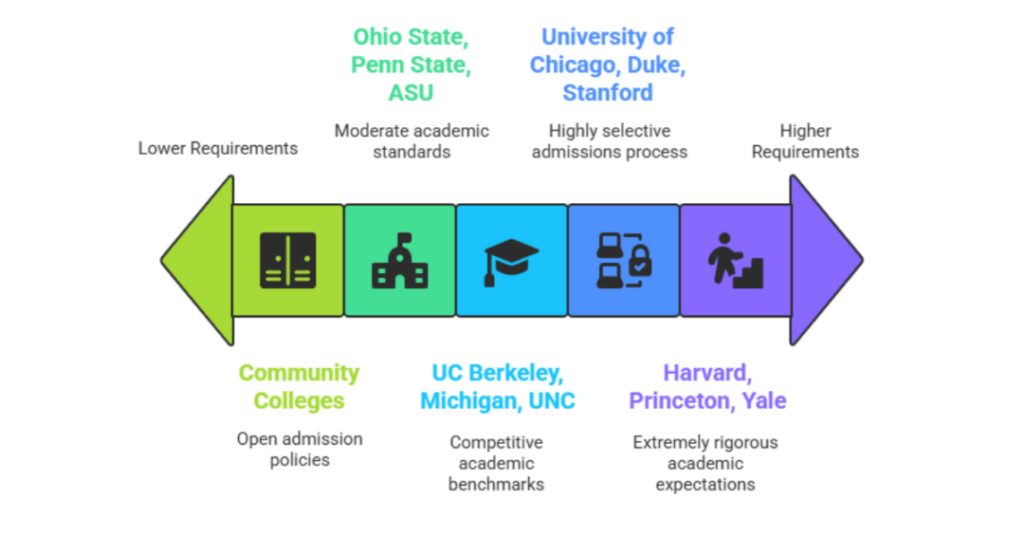8 September 2025
6 minutes read
What Are The SAT Score, ACT Score, And GPA Requirements For College Admission?

Key Takeaways
- Know SAT/ACT and GPA requirements for colleges because most selective schools still expect SAT 1400+, ACT 32+, and GPA near 3.9.
- Check testing policies carefully since many colleges that were test optional in 2021–2022 now require SAT or ACT again.
- Use percentile scores smartly by aiming above the 25th percentile and combining highest section scores to create a stronger composite.
In 2021, the average SAT score was around 1050, but schools like the University of Chicago want numbers way closer to 1500. Sure, many colleges call tests “optional,” but in reality, a strong SAT or ACT score can still decide your admission chances and scholarships. If you’re applying to college, knowing the exact score ranges and GPA requirements isn’t optional; it’s survival.
What Are The SAT Score, ACT Score, And GPA Requirements For College Admission?
As a study abroad expert, I’ve seen hundreds of applicants underestimate the role of test scores. Many believe GPA and essays will do the heavy lifting, only to be blindsided when colleges like the University of Chicago or Ivy League schools admit students with SAT scores above 1500 and ACT scores in the 33–35 range.

The truth is, while some schools claim to be “test-optional,” strong numbers are still the unspoken rule for admission and scholarships.
| College Tier / Example | Average SAT Score | Average ACT Score | Average GPA (Unweighted) |
|---|---|---|---|
| Ivy League (Harvard, Princeton, Yale) | 1480–1570 | 33–35 | 3.9–4.0 |
| Top Private (University of Chicago, Duke, Stanford) | 1460–1560 | 32–35 | 3.85–4.0 |
| Top Public (UC Berkeley, Michigan, UNC) | 1340–1520 | 30–34 | 3.7–3.9 |
| Mid-Tier Universities (Ohio State, Penn State, ASU) | 1150–1350 | 24–29 | 3.3–3.6 |
| Many State Colleges / Community Colleges | 950–1150 | 18–23 | 2.8–3.2 |
15 Colleges That Requires SAT Score, ACT Score And GPA In 2025
You either score high or you don’t get in.
If that line came straight from a college admissions board, it’d be just as brutal and just as real. As a study‑abroad expert, I’ve watched top schools suddenly flip back to requiring SAT, ACT, and GPA as the minimum ticket to the game. And that reinstatement isn’t random: it separates applicants who’ve done the bare minimum from those who came prepared to compete.
| College | Avg. Tuition (2025) | Insider Insight |
|---|---|---|
| Harvard University | ~$55k | Tests help identify strong students from under-resourced backgrounds |
| Yale University | ~$60k | Reinstated to improve holistic review equity |
| MIT | ~$58k | Tests are strong predictors of academic success |
| Dartmouth College | ~$61k | First Ivy to bring back requirement post-pandemic |
| Brown University | ~$57k | Required again for the 2025 cycle |
| Georgetown University | ~$62k | Tests level the evaluation playing field across applicants |
| Caltech | ~$60k | Firmly back on test-required path for STEM applicants |
| University of Florida | ~$28k (in-state) | Uses scores alongside GPA for holistic review |
| Florida State University | ~$25k (in-state) | Scores remain strong predictors of success |
| Georgia Tech | ~$34k (in-state) | Required for rigorous STEM vetting |
| University of Georgia | ~$30k (in-state) | Middle 50% SAT: 1300–1470; GPA 4.08–4.35 |
| UT Austin | ~$38k (in-state) | 25th–75th SAT range: 1240–1490; required for fall 2025 |
| Cornell University | ~$61k | Reinstating test requirement for fall 2026 applicants |
| Stanford University | ~$60k | Testing required again for fall 2026 admissions |
| Johns Hopkins University | ~$60k | Tests required again starting fall 2026 admissions |
Why Colleges Gives Importance To Standardized Testing For College Admission?
In 2021, even applicants with perfect GPAs were often weeded out because their SAT or ACT score didn’t make the cut. Schools like the University of Chicago or other elite institutions still weigh your SAT score and ACT score heavily. The admissions process isn’t just about being a good student; it’s about showing up in a way that makes your application undeniable. And yes, if you want a scholarship, that test score could make or break it.
Standardized testing isn’t some outdated ritual, it’s a strategic filter designed to level the field, predict performance, and streamline the college admission machinery. Here’s why many schools continue to care about your SAT and ACT, even when they claim to be “test-optional.”
1. Standardized Comparison Across Applicants
Your GPA can vary wildly depending on your school, teacher, or curriculum. SAT and ACT provide a uniform metric for college admission officers to compare applicants fairly. By checking where you fall in the 25th percentile to 75th percentile range, schools can quickly gauge if an applicant meets their admission requirements.
2. Predicting College Success
Research by the College Board shows that SAT score and ACT score correlate strongly with first-year college performance, especially in reading and writing and quantitative subjects. Colleges use this data to reduce uncertainty in their application process – after all, they want students who can survive the academic rigor without flunking out.
3. Scholarships Depend on Test Scores
Many merit-based scholarships still hinge on your SAT or ACT score. Even if your GPA is stellar, a lower test score can disqualify you from financial aid opportunities. This is why applicants often retake tests to strategically boost their chances when applying to college.
4. Streamlining the Admissions Process
When thousands of applications flood in, many schools rely on SAT and ACT scores as an initial filter. High-volume college admission offices can quickly categorize applicants who meet baseline academic thresholds, making the application process more efficient.
5. Skills Assessment Beyond GPA
The SAT and ACT don’t just test knowledge; they measure critical thinking, reading and writing skills, and problem-solving under pressure. This helps colleges identify applicants who can handle real-world academic challenges, not just memorize notes for exams. By analyzing test scores, admissions officers get a predictive snapshot of potential college performance.
How To Improve Your Chances To Study In Top Universities?
When I look back at the class of 2021 and class of 2022, one thing stands out: the students who actually got into top colleges weren’t just lucky. They had the numbers. The average GPA for students considered for admission at selective colleges was often 3.9+, while the average SAT score at places like the University of Michigan or University of California hovered around 1400–1500.
In contrast, students with a low GPA or a score range below the 25th percentile score had to fight twice as hard to prove college readiness.
1. Know Your GPA Reality
Your grade point average matters more than you think. Admissions officers often compare unweighted GPA, weighted GPA, and even the overall average GPA to spot who is serious. For the college admissions process, a minimum GPA of 3.7 is often required for admission at many colleges, though some schools use holistic admissions to offset weaker GPA scores with strong standardized test scores.
2. Master Testing Policies Early
I’ve seen students panic late in the admissions cycle when they realize scores are required. The truth is, colleges and universities may accept either the SAT or ACT, but requirements may vary. For example, the University of California system temporarily went test-optional for fall 2022 but reinstated stricter testing policies by fall 2023. Always check if you need to submit their SAT or ACT or if scores are not required at that particular college or university.
3. Use Percentile Scores to Your Advantage
Forget chasing perfect scores. What matters is whether your score falls within the range of scores that selective schools publish. If your sat range or composite score is below the 25th percentile score, admissions officers may pass over your file. But if you can create a new composite score by retaking, or use the highest scores from each section, you can give yourself the best shot. That’s how you beat the system many colleges require.
4. Think Beyond the Test
Colleges love context. The college application isn’t just about sat and act scores or the best SAT score you can report. School offers like AP or IB, earning college credits, and showing you can handle a possible GPA above the national average are equally important. Some four-year colleges have announced plans to weigh course rigor heavily, while places like the University of Oregon still consider test scores as part of their review.
Conclusion
At the end of the day, GPA, essays, and extracurriculars matter, but your SAT or ACT score still carries weight. Ignoring it is like walking into a game without checking the rules. If you’re serious about college admission and scholarships, understanding where you stand in the 25th percentile, knowing your GPA, and strategically deciding when to take the SAT or ACT can make the difference between getting accepted and being overlooked.
I know you still have questions, doubts, and maybe even confusion about what is right for you. That’s exactly where we can help. At Ambitio, our experts work one-on-one with students to map the right path, shortlist the best scholarships, and guide you through every step of the process. Book a 1-Hour call with our expert for No-Money.
FAQs
Can I get into a good college with a low GPA?
Yes, some colleges use holistic admissions to consider applicants with a low GPA. However, you may need to compensate with strong SAT or ACT scores, excellent essays, or outstanding extracurricular achievements.
Do all colleges require the SAT or ACT?
Not all colleges require standardized test scores, especially with the recent increase in test-optional policies. However, many schools still consider them an essential part of the application.
How important is my GPA in the college admissions process?
Your GPA is a critical component of your application, as it represents your academic performance over time. However, its importance varies by college, with some placing more weight on test scores or other factors.
Should I take both the SAT and the ACT?
It’s not necessary to take both tests, but some students choose to do so to see which one they perform better on. Colleges typically accept scores from either test.
How can I improve my SAT or ACT score?
Preparing thoroughly, taking practice tests, and possibly enrolling in a prep course can help improve your SAT or ACT scores.

You can study at top universities worldwide!
Get expert tips and tricks to get into top universities with a free expert session.
Book Your Free 30-Minute Session Now! Book a call now




























